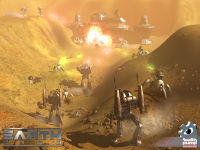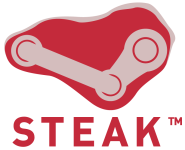Unless you count last Wednesday’s SiN: Steam, Earth 2160 is the first game on Steam to be released entirely unannounced, popping up yesterday with no fanfare at all past the obligatory news post. It’s just there on the Store page. Even the game’s fansites seem unaware of the news.
A demo is available, if you find 2160’s website (of your own accord: there is no link from the Store), navigate to the Downloads area and then ferret out a tiny link in a different part of the page from the main menu. All a potential customer has to go on, if he quite understandably can’t be bothered to or doesn’t know to do that, is a handful of (admittedly very good-looking) screens and some far-from-stellar reviews.
It could simply be that as the game isn’t what you might call approachable, Reality Pump don’t particularly want people to know too much about it and hope for some ‘blind’ sales. After all, their core audience is the RTS hardcore who already know everything they need to about the title. Yet, the situation is the same for Dangerous Waters (which at least has a trailer) and Space Empires IV: two obscure, specialist games with demos available that are neither provided nor linked to through the Store. This might be explained should demos be required to be exclusive, but as we’ve seen with the Darwinia demo and the Half-Life 2 demo’s standalone Steam installer, that is hardly an issue.
Valve’s forthcoming demo experiments are certainly interesting and worth waiting for, but in the meantime their policy of either no demos or demos only after a month of release is simply unproductive. When the demos have already been around for many months, why should they ever be held back?
Ritual’s SiN Episodes: Emergence has entered the preloading phase a full month before release, along with an updated version of the original SiN and a seperate multiplayer version that are both playable today. Emergence can be preloaded by clicking here; the other two games are already released and can only be downloaded after purchase.
Nintendo and Valve have announced a partnership covering the digital distribution of games for the Revolution’s ‘Virtual Console’, and the provision of a large number of back-catalogue titles for the PC, both through Steam.
“Nintendo’s highly successful market strategy has always been based around innovative and disruptive technologies. Steam provides both of these qualities, and we are delighted to today announce a partnership between Nintendo Co.,Ltd and Valve Software LLC for the use of the Steam network in the upcoming ‘Virtual Console’ for the Nintendo Revolution”, said Nintendo of America spokesperson Joe Kerr.
“As well as providing the complete Nintendo back catalogue and selected Sega titles for download, our new partnership extends into the personal computer space, with a selection of games being made available for the ‘Windows’, ‘Linux’ and ‘Mac OS X’ platforms through the established Steam service as provided by Valve to their customers today.”
This is the big one, no doubt about it. The adoption of Steam by an industry giant and its entry into the console market is an enormous step toward the widespread acceptance of digital distribution, not to mention a nice thing to put on your corporate CV. The press release also heavily implies the release of Steam for the ‘other’ PC platforms, something that Red Orchestra and Darwinia fans have been pining after ever since their games were released. Just don’t get your hopes up for Source to be ported too.
Overall though, the press release is raising questions. Exactly what difference will this announcement make for Steam on the PC? What Nintendo games will be released for it? How will Nintendo implement Steam on a console, and what features will they use? Will the console and PC implementations connect to each other? I’m sure anyone with a Nintendo console could come up with more issues still.
Perhaps E3 will bring answers, but knowing Nintendo we will have to wait until much closer to the Revolution’s “later half of 2006” release date to hear anything substantial.
A summary of the ‘What’s Next in Digital Distribution and Mainstream Games’ panel at GDC has been posted by GamesIndustry.biz, passing on a message of reassurance for traditional publishers, retail chains, and others not yet involved in the practice.
Gabe Newell explained how the Day of Defeat: Source Free Weekend had led to twice as many retail sales as online sales, while BioWare’s Ray Muzyka stated that developers “need to have both forms of distribution to be successful” and that his company would be using digital distribution to compliment retail purchases rather than distribute full products, a conservative tactic shared by publishing giant Electronic Arts with their Downloader service.
Xbox Live Arcade’s Greg Canessa echoed Muzyka’s sentiments, but Ritual’s Tom Mustaine warned that by next year’s conference the digital distribution movement would be more prominent: “A lot of people have been doing [digital distribution] in the casual games space”, Mustaine said, “but as far as AAA episodic, it’s right around the corner”.
The panel’s comments have more than a whiff of collusion about them, with the united front clearly preconceived to help limit any potential splits in the industry, but at the same time warning those dragging their heels to get on board before it is too late. While digital distribution’s complimentary role will undoubtedly remain for some time in the industry at large, whether publishers will be convinced to uproot their businesses to such a large extent for the prospect of weakening their market advantage on the basis of assurances like those of the panel’s remains to be seen. If the struggle undergone by the music industry is anything to go by, weak publishers like Atari and Eidos – perhaps even reasonably strong ones – may well drop away before the transition is complete.
Game Informer Online caught up with Gabe Newell and Doug Lombardi at GDC yesterday (thanks RP) for a meaty interview covering Steam, episodic delivery and the Source engine. Unfortunately the transcription becomes confused at several points: I’ve tried to make sense of these gaps when they occur.
Summary of points
- The Day of Defeat: Source Free Weekend led to more online sales in its immediate aftermath – but twice as many retail sales, even though the download was complete and the customers all had internet access. More
Newell: The result of letting people play for a free weekend is we sold a bunch of content, we did the billing of that content online for a whole bunch of people, but twice as many people who had never played Day Of Defeat before until that weekend went to the store and bought a copy and then used that to authenticate. They already had the bits on their machine. They just didn’t have the checkmark that said, “Yes, you can play this.” So we weren’t even fulfilling the product. They happened to have those bits on those discs, and [the purchase] really was just the ticket that said, “Yes, you can keep playing.”
- Valve are expanding Friends with a ‘buddy program’ of sorts for trials of multiplayer games. You will be able to give up to five friends access to your online games at any one point. More
Newell: One of the things that we really want to do is help people to get their friends to try our games. It’s a high priority right now for us to put all of the pieces [for that to happen] in place. If you bought a copy of one of our games you can give five trials to your friends. You type in your e-mail address and then you’ll see the first time that they play you’ll have this little screen where you can say, “Oh look, he’s playing. Oh, he hasn’t played yet so I’m going to delete him and replace him with somebody else.” And give your friends a chance to play. It’s a multiplayer game. You get notified as soon as they start playing so you can jump in. That’s the kind of thing we think is going to be super valuable at making that connected customer experience more effective.
- The question of in-game stat-logging is sidestepped (a good sign) for an anecdote explaining how useful Steam’s hardware survey is proving. More
Newell: Hardware companies and operating system companies say, “Wow, you have far more detailed information about people’s PCs than we do because we don’t have this connection [Steam] to our customers. We just send our PCs out in boxes that sit in warehouses someplace and we have no idea what our customers do with them afterwards. Whereas you guys can tell me exactly how many gamers have [GeForce] FX systems, how many of them are actually running dual threaded, how many of them have SLI for real?” They think that that’s super valuable.
- Valve are anticipating ‘two to three’ new releases or announcements of releases on Steam each month! More
Game Informer: With Darwinia and SiN rolling out soon, how many other games can we expect in the near future?
Newell: I think a lot. A whole bunch.
Lombardi: Yeah, we’re pacing about two or three new ones a month.
- Valve have not yet decided if Half-Life 3 will ever be made: they are instead waiting on the response to episodic releases. More
Newell: On the storytelling side I think right now we’re having a lot of fun – chapter, chapter, chapter. I assume at some point we’re going to say, and our fans are going to say, “That was really great for a while, but now we want the big one.” I think that we’re having [to make new choices] – TV show, TV show, TV show, movie. How do you make that decision? Fans like them both. But, some things you want to do with a movie-like piece, and some things work better as individual episodes.
Read the full interview.
While there is certainly a large amount of interesting information in the interview, particularly Valve’s ongoing experimentation with new trail models, the real event for Steam at GDC was the “What’s Next in Digital Distribution & Mainstream Games” panel. Unfortunately GDCTV.net, due last Wednesday, still hasn’t launched and we remain in the dark. Hopefully the broadcast will go up at some point in the next week; I’ll be covering it as soon as I can after it does.




